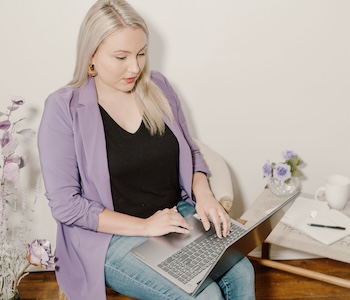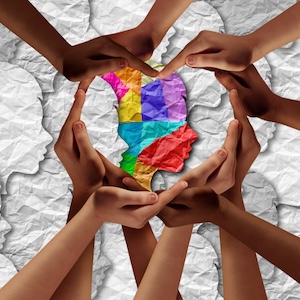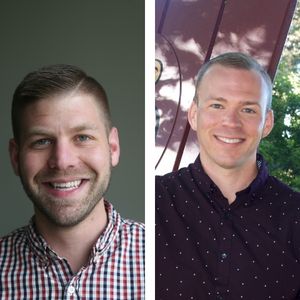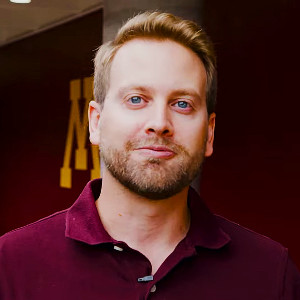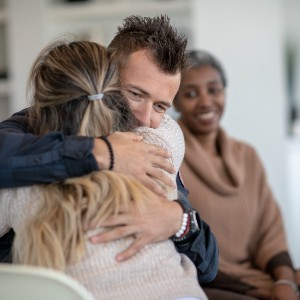Catching Up with Kaylah Vogt
In 2021, CCAPS interviewed MPS in Integrated Behavioral Health (IBH) student Kaylah Vogt, who was already an outspoken advocate for people with disabilities, particularly people who are Deaf/HH (hard of hearing) like herself.
We reconnected with her after she achieved major professional and personal milestones. She recently presented at a regional conference for the first time, and she also settled a discrimination lawsuit with a local hospital.
Being an Advocate
In the IBH program Kaylah focused her assignments and research around topics she was most passionate about, namely Deaf/HH and disability rights in the context of mental health.
Working with IBH faculty member Emily Jordan Jensen, Kaylah developed a presentation for the Minnesota Psychological Association conference titled "Addressing the Shortage of Mental Health Therapists Fluent in ASL." In it, Kaylah talked about the application of the Minority Stress Model as a framework when working with Deaf/HH clients. She discussed the barriers these clients face, including employment discrimination, supplemental security income and social security disability insurance restrictions, and limited access to health care.
She also emphasized that the current research on Deaf/HH people is nearly nonexistent, and therefore we often turn to personal stories to gather information. She encouraged the audience to look for the right media representations of Deaf/HH people.
“I discussed that without cultural competency, counseling practices can do more harm than good, turning Deaf/HH clients away after having already experienced obstacles to health care services,” Kaylah says.
She shared tips on how hearing clinicians can better serve Deaf/HH clients, including consulting with Deaf/HH mental health professionals, working with American Sign Language (ASL) interpreters, and connecting with the Deaf/HH community.
Being a Communicator
“I was excited to put my presentation together,” Kaylah says, which she gave entirely online in ASL. “I looked at the existing information, including the fact that there is a shortage of ASL fluent mental health therapists, and that changing overnight is unlikely. I looked at the next five to ten years, knowing that Deaf/HH clients are likely going to work with hearing clinicians and certified ASL interpreters in various treatment settings.”
Prior to the presentation, Kaylah worked with her interpreter, Nicole A., by letting her know the words she typically uses, her pacing style, and which words to emphasize. She also shared her slides ahead of time in case she had any questions.
While it required extra preparation, this opportunity taught Kaylah that she could attend and present at conferences anywhere, and that it is possible to receive the appropriate accommodations and reimbursement.
“In the past, I voiced myself all the time. It was not an easy adjustment, not using my voice and trusting my interpreter,” she says. “However, I want to reserve my energy to do what I do best, and that is presenting on behalf of the Deaf/HH community. I will continue to be involved in the professional development of mental health clinicians.”
Being Vulnerable
Kaylah is committed to increasing the visibility of health care professionals with disabilities so that all patients can feel safe and supported. Having struggled with mental health issues herself, she understands the importance of building trust in the health care system.
During her IBH program, Kaylah suffered from anxiety and depression. She didn’t tell her professors or classmates because she felt that her problems would be minimized. After she missed a few classes, a classmate finally reached out and asked how she was doing.
“She showed me that people do care!” Kaylah says of her classmate, Christofili C., who happens to know ASL. The two began to meet for pizza and coffee. She says it was unfamiliar to exercise vulnerability like that, but she was grateful to make a “true human connection” by being her authentic self.
Being an Example
Kaylah has begun a memoir about her mental health journey, focusing on themes of discovery and self-acceptance. She remembers reading powerful stories that helped her and wants to pay it forward. “I am writing a book I wish I had read when I was a teenager and young adult,” she says.
Kaylah will be graduating this spring and plans to specialize in trauma-based treatments, like eye movement desensitization and reprocessing (EMDR), brainspotting, and internal family systems (IFS). Her research interests include trauma informed and safety-centered therapies for clients with disabilities.
“I love what I do. I am removing barriers in the US health care system by showing up to my profession.”
Photos courtesy of Payton Rademacher Photography
Mia Boos is a writer and content strategist with the College of Continuing and Professional Studies, covering the College’s graduate programs and undergraduate individualized degree programs. She joined the CCAPS Marketing team in 2014 and has worked for Thomson Reuters and New York University. Connect with her via LinkedIn.

